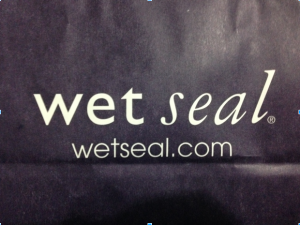There is a commonality shared between practically every storefront in America that speaks of underlying prejudice. Walk past Forever 21, Wet Seal, PacSun, Hollister, American Apparel, Aeropostale, Abercrombie & Fitch, and what do you see? The better question is: what is missing?

Forever 21, Wet Seal, Pacsun, Hollister, American Apparel, Aeropostale, and Abercrombie & Fitch share a common look, literally. Wet Seal’s company was sued by three African American women in 2012 for allegedly favoring white employees. Nicole Codgell said that the senior vice president wanted a store manager with “blonde hair and blue eyes.”
Racially diverse models.
Since these stores promote the American image, as such, the posters displayed in the front and the interior show primarily black people and white people. In these photos and advertisements are an extreme misrepresentation of the mixture of heritage that reside in the United States. Unfortunately, even though Asians, Indians, American Indians, Latinos, and many other ethnicities inhabit America, they severely lack acknowledgement, as most commercials use the typical “American,” i.e. white or black.
Rarely seen a nationally renown Asian or Indian model who regularly appears in clothing stores, commercials, or otherwise. A pattern exists, and it is a pattern of discrimination. In fact, it has been a mere two times that I saw Asian models, and it was with surprise and elation that my race was finally being represented. While the models didn’t represent my ethnicity for me to experience joy, the fact that they were Asian was enough.
In one instance, I literally stopped in my tracks when I viewed a poster in Forever21; it was of an Asian model sandwiched between white and black models. Excited, I actually took a picture of it. Naively, the advertisement was enough for me to hail Forever21 as “culturally diverse,” even though she was the only Asian person in the picture. Sadly, I have yet to see her or another Asian model in their advertisements since.
What does that say?
I make it a point not to shop in stores such as Hollister, American Apparel, and their “cousins,” because I make it a point not to encourage racism. These stores have shown bigotry in their actions, even though they cover it with false platitudes.
In September of 2012, models dressed as lifeguards were sent to Yeoudio, South Korea to greet customers for the grand opening of a Hollister store. Instead of displaying dignity and friendliness, or even being decent human beings, the Hollister models decided to mock their customers by making racist and obscene hand gestures.
Reportedly, the models uploaded photos of themselves squinty-eyed with peace signs on twitter, with comments on how much the patrons “ruhhvvv itt.” After the debacle, Michael Yaki, member of the U.S. Commission on Civil Rights, said, “A company that targets teen and twenty-something consumers in the United States needs to wake up to the fact that the upcoming generation is majority-minority. A company trying to extend its reach globally has to have a strong record on race issues.”
Additionally, another was photographed with holding up a middle finger in a picture with a customer. Although the employees were fired, and Hollister posted an apology on Facebook (that no longer appears on their page), there have been several instances in which Hollister’s parent company, Abercrombie & Fitch, has been accused of being discriminatory.
On another note, Wet Seal was being sued by three black former managers in 2012 due to their belief that the company was favoring blue-eyed blondes. Nicole Cogdell claimed she was replaced as store manager two months after receiving her position, and the job went to a white employee who was less experienced and had a higher pay. Purportedly, she was removed from the promotion after the senior vice president of the company visited 20 different locations in Philadelphia and emailed subordinates that “store teams – need diversity/African American dominate – huge issue.” According to Cogdell, the senior vice president said that she wanted a store manager with “blond hair and blue eyes.”
In 2009, Abercrombie & Fitch were sued for ordering a Muslim woman to take off her hijab or be jobless; even though she worked in the stockroom, the employers reasoned that she was not following their “look policy.” Umme-Hani Khan chose not to follow the command, and in February 2010, she was fired.
Due to these discrepancies in tolerance, stores such as American Apparel, Abercrombie & Fitch, and others have gained a reputation for spottiness in racial issues. However, millions of Americans continue to aspire for getting hired to be a “model” for these stores and purchase their clothes.
Clearly, these cases are not singular, and the fact that they frequently occur shows that racism is a prominent issue that needs to be resolved. There is no excuse for advocating a store that remains prejudiced despite the numerous amounts of apologies and lawsuits that have cropped up. Minorities are not being respected or represented in America, and frankly, it is absurd that this issue has sustained over the years.
My solution? Don’t give your money to these stores for cheaply made clothes that, in reality, aren’t worth it, and serve as the harbinger of racial bigotry.

